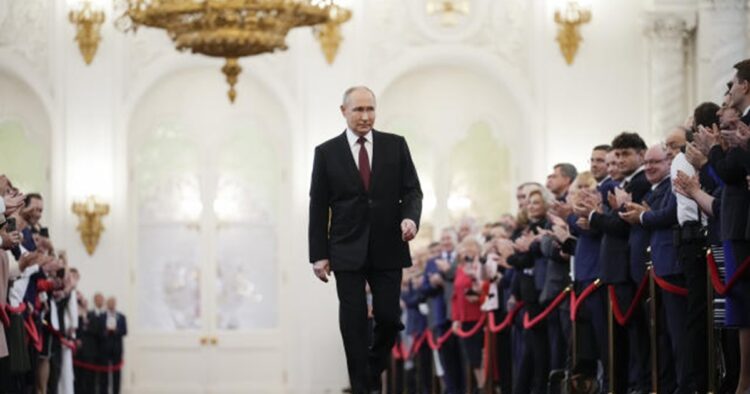Vladimir Putin has taken the oath for his fifth term as Russia’s leader in a ceremony held in the Grand Kremlin Palace. However, the event was marked by the absence of key Western envoys, including those from the UK, US, and most European countries, who boycotted the inauguration.
Notably, ambassadors from Bharat and China attended the ceremony, signifying their continued engagement with Russia despite growing tensions with the West.
During his speech, Putin highlighted Russia’s national interests amidst ongoing conflicts, particularly in Ukraine, where tens of thousands have lost their lives. He portrayed his foreign policy as aligned with the will of the Russian people, noting their support for defending the nation’s values and interests.
While the inauguration itself may not bring significant changes internally, it could lead to governmental restructuring and economic measures.
The dissolution of the cabinet by Prime Minister Mikhail Mishustin signals a potential shake-up in the government, possibly involving unpopular decisions such as tax hikes to offset the costs of the war and Western sanctions.
Several Western countries recalled their ambassadors ahead of the ceremony, citing various reasons including alleged cyber-attacks and concerns over Russia’s actions in Ukraine. This reflects the strained relations between Russia and the West, which have deteriorated in recent years.
Opposition figures used the occasion to display the negative aspects of Putin’s rule, including political repression and conflicts abroad. Yulia Navalnaya, the wife of deceased opposition leader Alexei Navalny, criticized Putin’s tenure, pointing to issues like war and political assassinations.
International condemnation of Putin’s actions was also evident, with Estonian Foreign Minister Margus Tsahkna announcing that Estonian diplomats would not attend the inauguration due to Russia’s aggression towards Ukraine. He reiterated concerns over Putin’s alleged war crimes and emphasized solidarity with Ukraine.
Putin’s extended tenure raises concerns about the consolidation of power and Russia’s trajectory towards authoritarianism. With the potential to surpass Joseph Stalin as the longest-serving Kremlin leader, Putin’s continued rule prompts questions about the future of Russian politics and democracy.
In a religious ceremony following the inauguration, Russian Patriarch Kirill compared Putin to historical figures, portraying him as a leader capable of making tough decisions for the state’s benefit.
However, such comparisons drew criticism, particularly from those who view Putin’s rule as detrimental to democracy and human rights.
Despite international criticism and diplomatic tensions, Putin remains defiant, asserting Russia’s position on the global stage and calling for dialogue based on mutual respect and cooperation.

















Comments